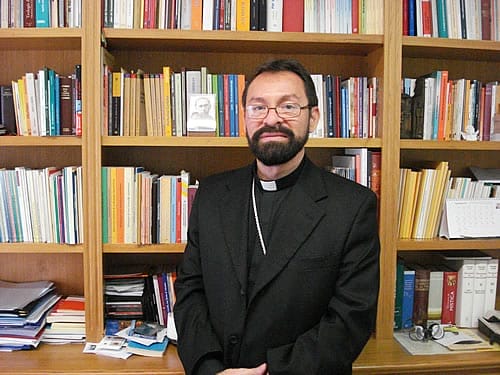P.- What would you highlight in your first visit to the Pope as Bishop?
R.- I would highlight the friendly reception and familiarity not only of Pope Benedict XVI, but also of his immediate collaborators in the different dicasteries and Roman Congregations, who have shown interest in sharing information about some matters concerning the Church in Panama, such as, the formation of future priests, vocational promotion, the formation of the laity and catechists, the challenge of poverty and the evangelizing activity of the Church, the situation of the family, etc.
Q.- What aspect of the discourse that the Pope has addressed to you after the visit would you stress?
A.- To me in particular what has called my attention was the interest of the Pope in the impact of the means of social communication (mass media) in the orientation of a culture that promotes a series of values or, perhaps, anti-values, that are sometimes contrary to what are specifically Christian values, that requires of the Church and particularly of the bishops a response that is coherent with the values of the Gospel.
Q.- How has your having been appointed bishop changed your life?
A.- Well, it is a change that demands time to assimilate. I believe that in an interview I have referred to this point. I have to learn to be a bishop and, as much possible, maintain, by conviction, that which is essential of the Augustinian Recollect charism: fraternal life and apostolic commitment in community.


Mons. Saldaña with Fr. Miguel Miró, who interviewed him. Prelatura de Bocas del Toro
Q.- Could you briefly describe to us the Prelature of the Bocas del Toro and share with us the difficulties they encounter in the evangelization and what common plans do they have?
A.- The main difficulty that I have observed during these first months is: the need for enough personnel to face the challenge of the formation of the laity, to deal with the theme of inculturation of the Gospel, of vocational promotion. Another challenge is that of poverty and extreme poverty, that affects above all the indigenous who represent 60% of the population of the Prelature (approximately 130,000 inhabitants).
Q.- How do they face the challenge of inculturation in the evangelization?
A.- About this theme the Fathers of the Mission have exerted great efforts of inculturation beginning with their continual presence, their accompaniment of the indigenous peoples Ngobe-ngobe and Naso in their territorial claims, in the recovery of their historical memory that guards the oral tradition of these ethnics with their myths and legends, in the translation of prayers in their own languages, in some parts of the Rite of the Mass.
Q.- How have they organized the pastoral on family and vocation?
A.- These are two points in which efforts have been exerted, but have not yet materialized either in greater consistency among Christian families, or in abundance of vocations to consecrated life or priestly ministry.
Q.- How many communities and Augustinian Recollect religious does the Prelature have?
A.- At present we have ten Augustinian Recollect religious priests distributed into four communities who take care of five parishes. Half of these have between fifteen and thirty years of missionary service in the Prelature.
Q.- Could you indicate to us some of your desires and hopes as Pastor of Bocas del Toro?
A.- As Pastor how I wish to have more priests, more lay people who are willing to collaborate in the evangelizing mission of the Church, and to have well-established families who could serve as natural seedbed of vocations that the Church needs.
|
The Message of the Pope to the Bishops of Panama |
|
Apostolic Palace, Castelgandolfo. Your country, as elsewhere, is experiencing difficult moments that cause unease, and at the same time, situations that rouse great hope. At present, it is exceptionally crucial that the Church in Panama does not fail to shed light that contributes to the solutions of the pressing human problems, promoting in the society a moral consensus on fundamental values. For this reason, it is but necessary to put in circulation the Compendium of the Social Doctrine of the Church, which facilitates a more profound and systematic ecclesial orientation that the laity, in particular, has to assume in the politico-socio-economic field, fostering, at the same time, its proper application to concrete circumstances. Thus, Christian hope can illumine the people of Panama, who thirst for the truth about God and man in the midst of poverty, juvenile violence, lack of education, health services and shelter, harassment from innumerable sectors or corruption, that, in different ways, perturb their life and impede their integral development. |



